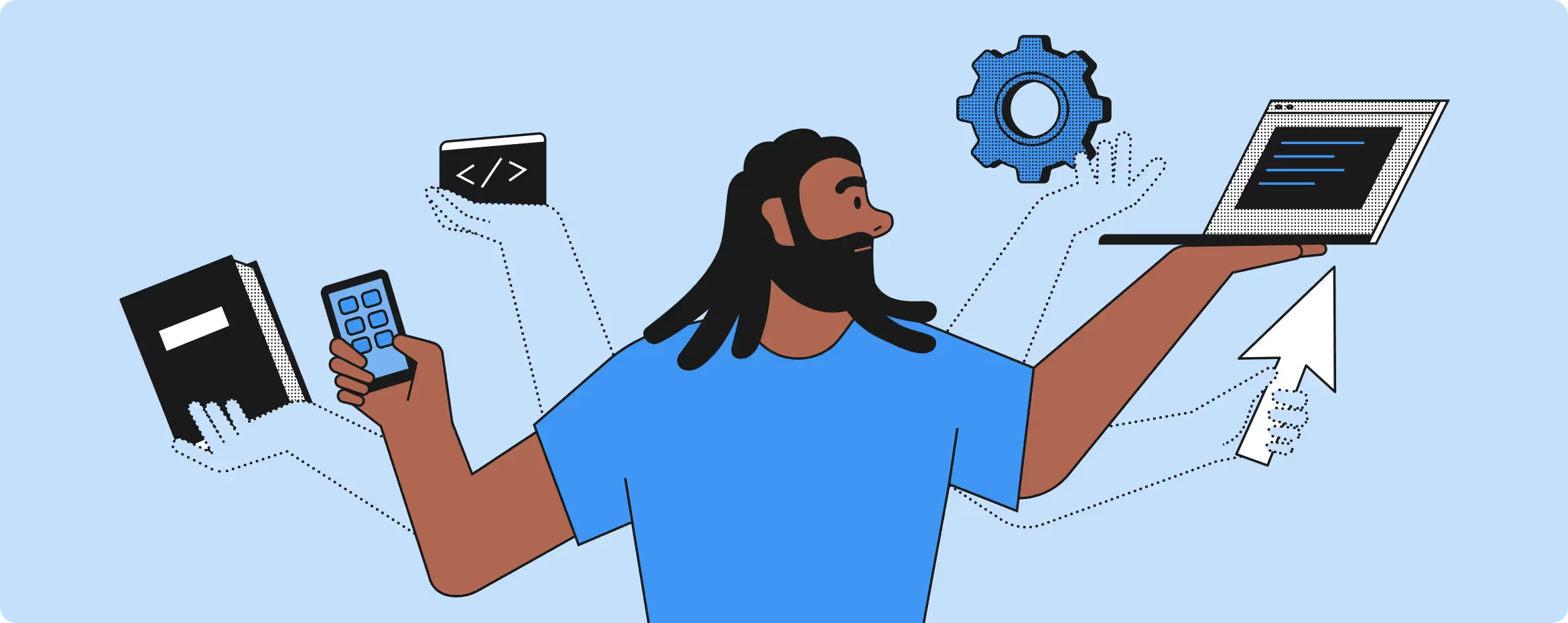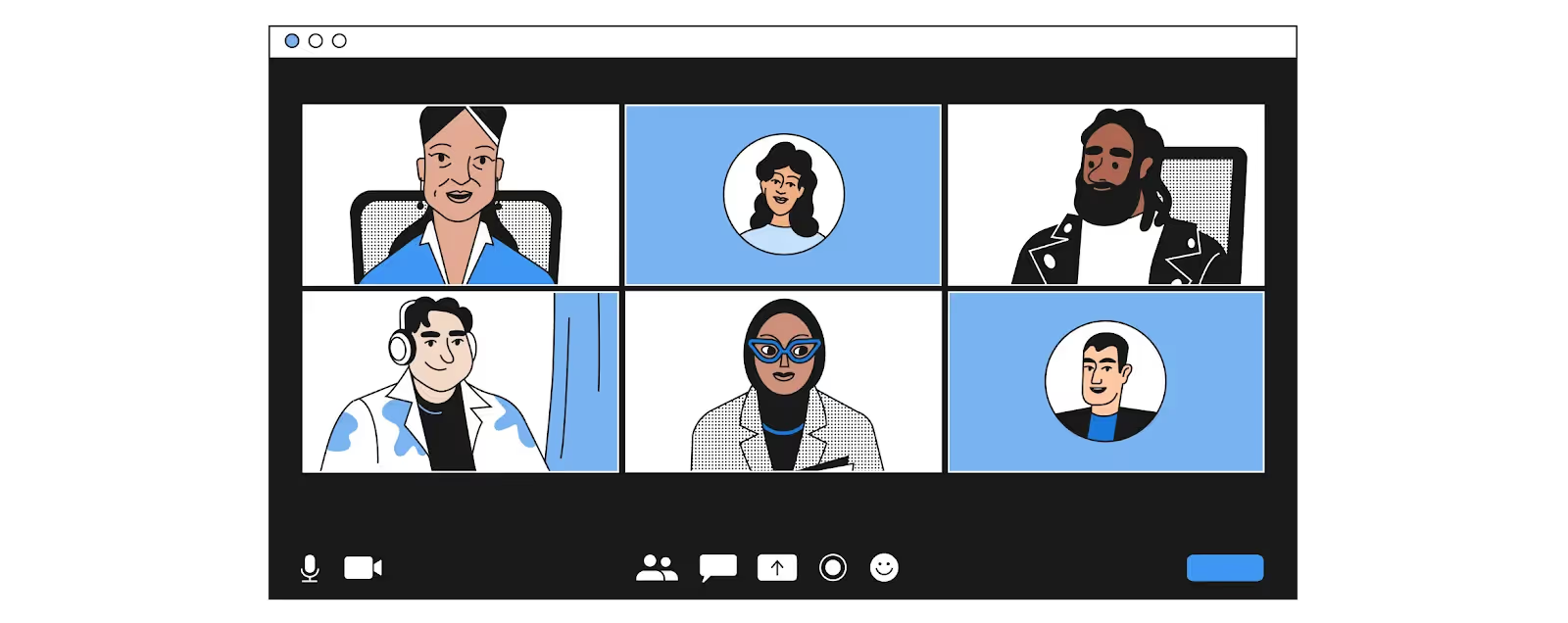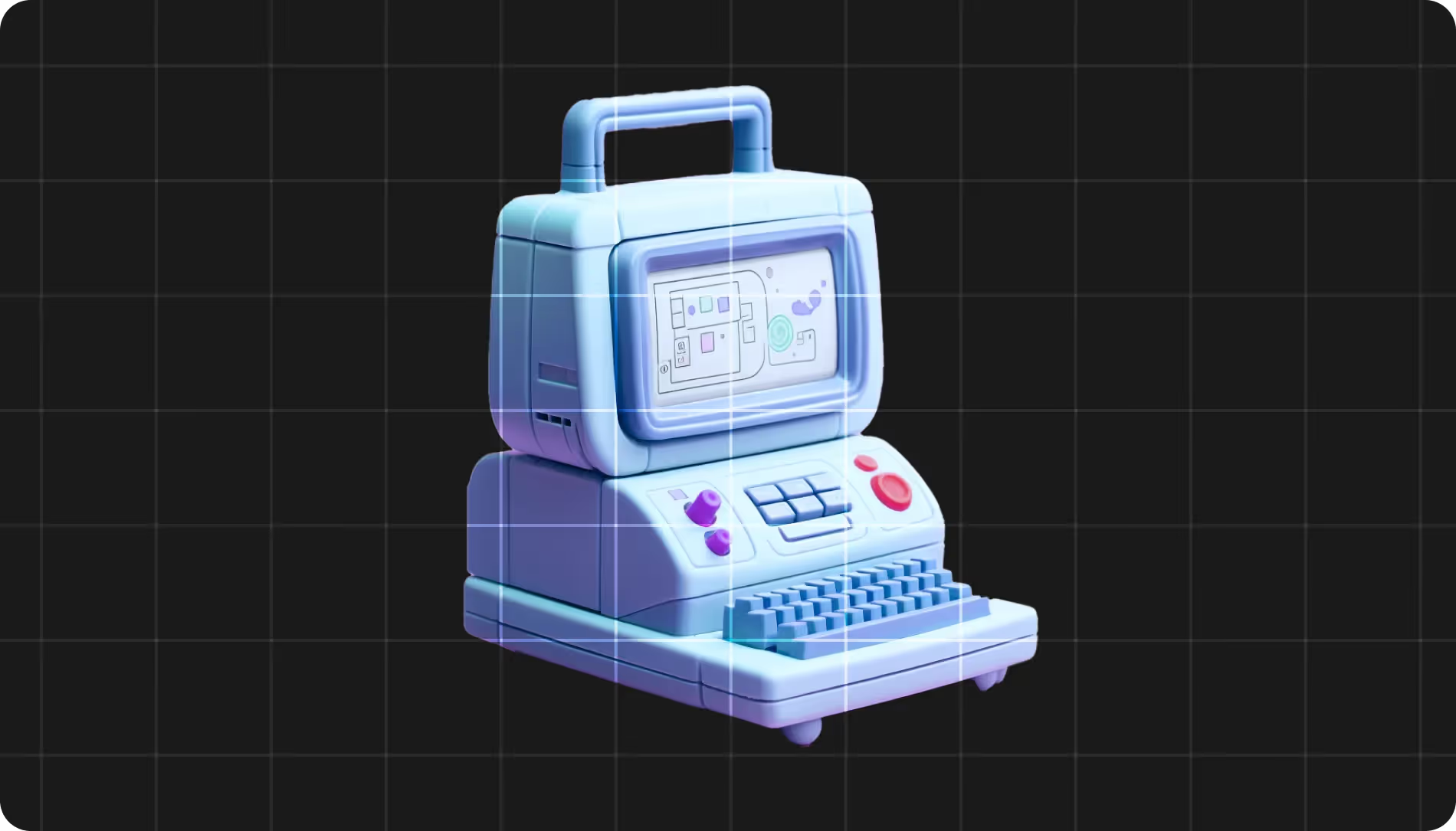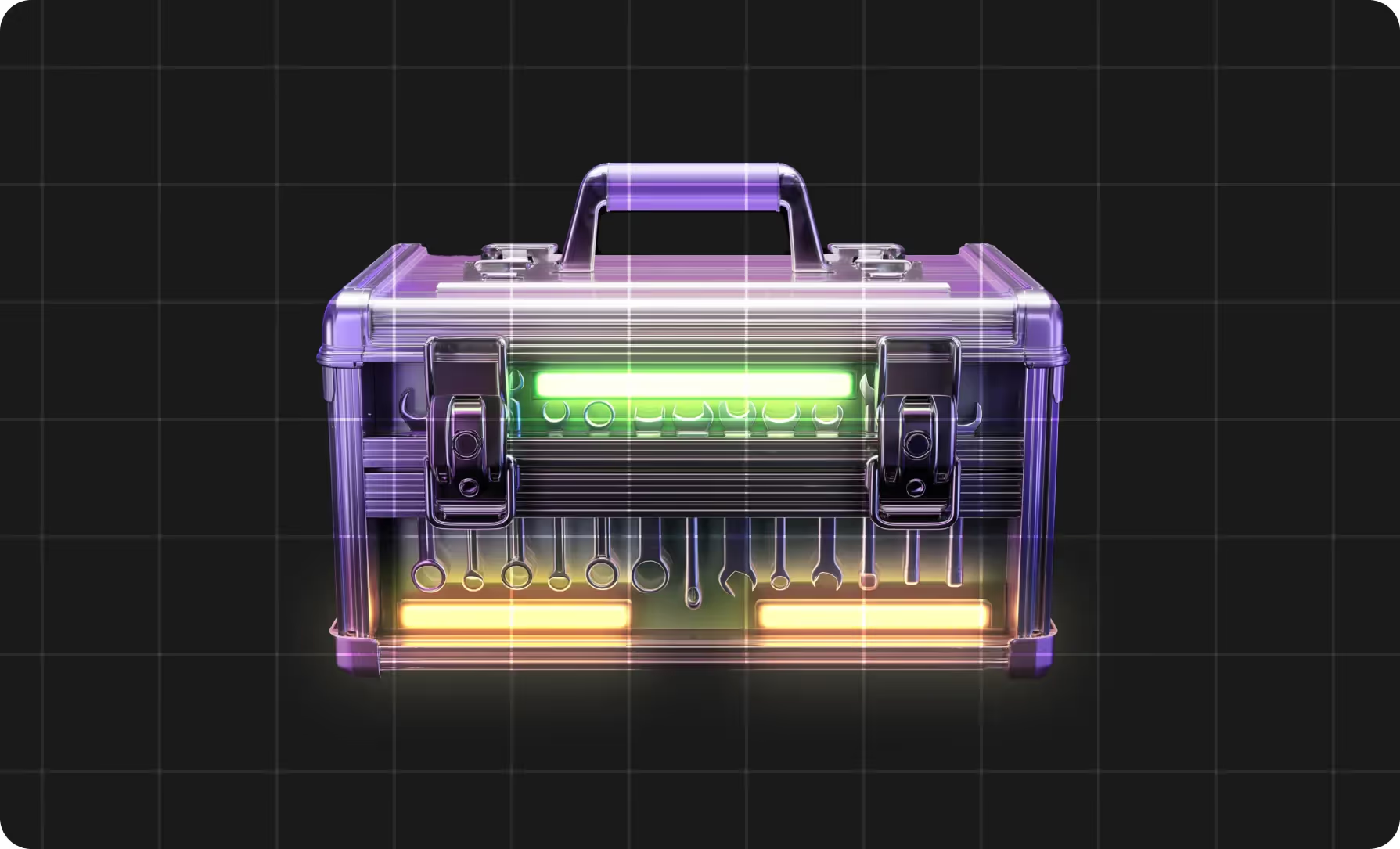If you’re wondering this, you’re in good company. This is something we get asked a lot, also in the form of ‘Is software engineering hard?’ And we’re not going to lie, it’s not easy. It’s a skill. Is it hard to learn to play an instrument? Is it hard to master a new spoken language? The honest answer for every question is: yes.
But is prepping yourself for a software engineer career worth it? The answer to this is also an emphatic yes.
So let’s get into the quirks you might encounter in software engineering as well as how you can overcome them.
What is software engineering?
This term can be remarkably slippery. To make sure we’re all on the same page, here’s the definition we think is broad enough to be encompassing without being too vague:
Okay, so is software engineering hard?
To put it bluntly (and overly simplistically), yes, software engineering can be hard to learn at first. Why? Well, there are a few reasons. Here are a few things that can be challenging and tips for how you can overcome them. Keep in mind: none of these challenges are insurmountable. You got this!
1. Software engineering can be complex

This is our first entry for a reason; software is inherently complex. Think about it: you’re writing instructions for a computer to follow. They have to be didactic, exact, and unambiguous. The computer interpreting your code will never think, “Oh, this line of code probably means…” In addition, as you code, you also need to keep in mind all the other components, interactions, and dependencies present.
Then, you often find yourself bridging a few different languages and methodologies that approach problems in their own unique ways. Wrangling software is the first thing a software developer needs to learn. But there are a few things we should mention so you’re not surprised:
Starting out, the code itself can be hard to handle
Your code breaks and the error message says something like "TypeError: Cannot read property of undefined" without telling you where or why. You'll spend hours tracking down a missing semicolon or a typo in a variable name three files away from where the error shows up. Then, sometimes your code works but you don't know why, or worse, it doesn't work and you have no clue why. But then when you copy something from Stack Overflow, change a few things to fit your situation, suddenly it works. The thing is, you've learned nothing and you're terrified to touch it again.
Then there's thinking in edge cases, which doesn't come naturally to most. You write code that works perfectly for what you tested, then users break it immediately. What if they enter a negative number? What if they click the button 78 times just because? Anticipating everything that could go wrong takes a mental shift.
The tools and setup can be hard to wrap your head around
Before writing a single line of code, you're wrestling with installing the right versions of languages, configuring paths, dealing with dependencies that conflict with one another, and following setup guides that assume you already know what you're doing.
And even with all the best advice telling you to check it out, Git can be challenging at first. You're merging, branching, rebasing, and suddenly, you find yourself somewhat lost. Then, when trying to get a handle on things, Stack Overflow answers assume you understand things you haven’t encountered yet, and documentation reads like it was written for people who already know the answer. You can find that the gap between tutorials and real projects is massive.
Tutorials hold your hand through perfect scenarios. Real projects have messy requirements, existing codebases written by five different people, and problems Google doesn't have clean answers for. Coming into coding with no guidance or instruction can be difficult.
How to overcome complexity:
Reach out to experts in the field
There are tons of organizations for people who want to get into tech. You can follow the example of Linda Kovacs, who connected with Women Who Code, an international non-profit supporting women who want to break into tech. Through them, she found out about a program that helped her dive into the field and learn software engineering.
Study
You had to see this coming. The best way to get a handle on the intricacies of code is to, well, learn how to code. Now, there are several ways of going about this. You can get a college degree in computer science, use online resources, or, as we highly (and humbly) recommend, you could also join a coding bootcamp.
Get hands-on experience
This flows from the previous recommendation. You can learn the basics of languages such as Python, HTML/CSS, JavaScript, and SQL, but to really master them, you should put them to use (IDEs can help here, and JetBrains IDEs are free for students). This will give you the practice you need so you can anticipate and tackle complex issues with ease. For example, you can launch a personal project you tinker with in your free time, or you can find an externship.
2. Tech marches on

Every field advances. Just consider publishing. We went from writing out books by hand to using the printing press to then producing books on a massive, industrial scale. The only thing is that, for publishing, this was a journey of around half a millennium. For tech, a similar chain of advancement has occurred in roughly a fifth of that time (or less, depending on how you measure).
In tech, things are constantly changing and advancing. This means that, as a field, it is rarely consistent year over year. The tasks you are expected to do will change — maybe you were a web developer and now you’re being asked to take part in a machine learning project. The dynamism can be disorienting for some people.
In fact, in recent years with the rise of AI, the expectations and roles within software engineering have shifted. Now, you’re going to be coding in partnership with an AI tool so you can quickly produce the boilerplate code that was previously plain drudgery. For many of the top roles, if you’re not using AI coding apps like Cursor or Kilo Code, you’ll be falling behind your colleagues.
But we also mentioned new roles. And that’s another major shift that’s happening; software engineers are now not just using AI tools. Often, with the right know-how and tools in their back pocket, software engineers are the ones contributing to projects building these AI coding tools in positions such as AI engineer. In short, it’s a dynamic field, which is thrilling for some, but can be daunting for others.
How to stay up-to-date:
Join professional communities
Whether online or in-person, stay active in the tech communities that interest you. Curious about machine learning? There are people just like you. If you check in with the community, you might find some new piece of tech that someone is applying in novel ways, and this might spur you to start seeing what it can do. Before you know it, you’ve figured it out and can start using it in your day-to-day work.
Stay curious
The constant advancement of software engineering is a challenge, sure, but it’s also exciting. There’s always something new coming out, so if you practice a mindset of openness and curiosity, you can find yourself growing naturally as a result of your genuine interest. You can foster this sort of receptiveness by subscribing to software engineering YouTube channels, for example.
Collaborate with diverse specialists
Within software development, it’s rare that a coder works entirely alone. In fact, diverse teams come together for complex projects. That means that you will work with people from different functions who have new perspectives and insights into tech that you might not encounter in your usual day-to-day work. Take advantage of these interactions to discover what exciting developments are happening in tech at large, not just within your specific field.
Pursue continuous learning
Find the subjects that excite you and pursue them. This will ensure you stay up to date with tech’s advancement as a matter of course. Then, look for a mentor at your organization who has expertise in the subjects; they can help guide you. They might even help you choose the right learning materials your organization already has made available to its workers or assist you as you choose external learning opportunities that’ll keep you abreast of the latest in software.
3. Projects can be ambiguous and requirements can change

Often, these are two different categories of challenges, but we’ve grouped them into one entry because they share a core feature: they can lead to rework. To avoid ambiguity, software engineers must put in effort to drill down to find specific tasks they should accomplish to solve specific problems.
However, as we’ve touched on previously, tech as an industry can be subject to significant change. That’s where changing requirements come in, and no amount of initial work clarification can prevent rework here.
Business and user needs might change. Market trends might suddenly shift. Unforeseen challenges might crop up. This can strain timelines and budgets and cause frustration if a software engineer working on a web development project suddenly has to make an app instead.
How to tackle ambiguity and changing requirements:
Plan
To reduce the likelihood of shifts in requirements, plan to collect user and business feedback as early and as thoroughly as possible. Then, create a schedule that treats changing requirements as an inevitability. If the project stays the same — great! That means you have extra time to refine the software even further. But, if something changes, a plan with baked-in space for change will make sure that you and your team already have the time, resources, and budget to be flexible.
Use project management tools
What is the project about? It’s detailed in the tool. When’s the due date? Again, that’s shown in the tool. Who’s doing what and where are they in that process? You know where to find that info. What’s changing and why, and how are the deadlines going to adjust to reflect the new reality? You’ll never guess where those details can be found. In short, these tools are great swords for the Gordian Knots of ambiguity and changing requirements.
Communicate
As a software developer, you need clarity on what you should be building. Communication is absolutely key. And this extends beyond just reducing ambiguity or clarifying requirements. Communication helps a team cohere and allows for expertise to mesh and become mutually complementary. If a team is unified and has a clear goal, any unexpected difficulties can be easily addressed.
4. You need to have strong soft skills to work with people (gasp!)

Software engineering is a collaborative process. Coders need to talk to stakeholders to prevent ambiguity, build tech with people from diverse backgrounds who have different skills and experience levels, and maintain a team atmosphere that is positive and conducive to getting projects done.
We know this isn’t just a challenge in software engineering, but there is a cultural assumption that coders hide in their programming bubbles and that they rarely have to do the work of building consensus. That’s largely a myth. Software engineering, like any specialization, is something usually done along with a team. And that comes with its own challenges.
How to collaborate more effectively:
Use collaboration and version control tools
If you need to quickly get in touch with someone about something small, messaging and collaboration tools like Slack can be especially helpful. Likewise, if you want to see what the latest code is as well as what has changed, a version control system like Git will allow you to find all the information you need. In both cases, the tech will make it easier to work with a team, especially if it is remote or otherwise distributed.
Regular short meetings
These meetings, usually called standup meetings, keep everyone in the loop. They allow teams to share updates, mention blockers, and discuss progress. While usually less in-depth than planning meetings with stakeholders, these conversations help a team maintain social contact, stay aware of the work being done, and naturally align or offer assistance.
Team building
Yeah, this is often parodied and mocked, and when it goes too far, it can be excruciating. But nonetheless, people who know each other work together better. If you are friendly with someone whose component is late, you might have the added context that their kid is home sick from school, for example. So spending time socializing among teams, even if it’s a short, casual chat over Zoom, can help them cohere and work together with less friction.
How to become a successful software engineer
If your question has now moved from ‘Is software development hard?’ to ‘Is it hard to become a software engineer?’ then we have another answer for you: no, but it will take dedication. People from music teachers to graphic designers have made the switch, and so can you. At TripleTen, we’ll teach you the tech you need to know to become a software engineer, help you build a portfolio that will make hiring managers want to talk to you, and give you the soft skills that will set you up for a long career in software.
To get the nitty-gritty on how and what we teach, check out our Software Engineering bootcamp.
FAQ
Why should I become a software engineer?
Software engineering pays well, and you can work from basically anywhere. You're solving real problems and building things people actually use. There's always something new to learn, which keeps you sharp and moving through your career. The jobs are stable, you can jump between industries easily, and where you live doesn't matter anymore. If making stuff work inspires you, you'll also find the career rewarding.
Is software engineering a good career?
Yes, software engineering is a solid career. The money's good, the jobs are stable, and you've got room to move up. Right now, companies need engineers more than engineers need companies, so you've got some bargaining power. Plus, the skills you pick up work across different fields. The work-life balance can be great, too, but it depends on the company, so check out the culture before you commit to anything.
Is software engineering harder than computer science?
Software engineering and computer science are just different things. Engineering is about building actual stuff: writing code, fixing bugs, and collaborating with people. Computer science leans into theory, algorithms, and math. Neither one's inherently tougher; they just need different skill sets. Hands-on people usually prefer engineering, but if you like abstract concepts and proofs, CS might be more your speed.
How difficult is software engineering?
Software engineering is challenging but totally doable if you put in the work. The beginning's the major hurdle; thinking in new ways and learning syntax requires a bit of a mental shift. Debugging and designing systems also tend to initially trip up first-time coders. After six to 12 months of consistent practice, concepts start meshing, however, so sticking with it matters way more than natural talent.
Is it hard to get a job in software engineering?
It can be hard to get an entry-level job in software engineering, there’s no way around it. But it’s possible with the right prep. Build three to five real projects that show you can code. Practice coding interview tasks on Leetcode or similar sites. Also, networking matters, so go to meetups and get active on LinkedIn. Plan on sending out 100-200 applications over several months. Just don’t quit and you’ll get there.
Is software engineering hard if you're bad at math?
No, software engineering isn’t hard if you’re bad at math. In fact, most engineering jobs barely touch complex math. They just use basic logic and algebra. You'll see advanced math in specialized areas like machine learning, but not most engineering ones. Problem-solving abilities matter more than being a math whiz. If you can spot patterns and think logically, you're good to go without the heavy math.
How long does it take to become a software engineer with no experience?
Realistically, it can take six to 18 months to become a software engineer from scratch. Bootcamps compress it down to nine months. Teaching yourself takes significantly longer but costs less. Shoot for 20-30 hours a week of coding to get job-ready. Importantly, "job-ready" just means you can build functional projects, understand data structures, and handle technical interviews, not that you’re an expert. Start applying once you've nailed down the fundamentals.
What's the hardest part of being a software engineer?
The hardest part of being a software engineer depends on your work style, but it can include debugging complicated systems, dealing with requirements that change in the middle of a project, imposter syndrome sticking around even when you've got years of experience, juggling technical debt against shipping new features, and staying current with rapid advancement can feel exhausting if you don't set some boundaries.
Can I learn software engineering on my own, or do I need a degree?
You can learn software engineering on your own. Plenty of successful engineers went that route. Build a strong portfolio, contribute to open-source projects, and network hard. To be fair, some companies want degrees, but a lot more care about what you can actually do. Bootcamps are the middle option, as they merge the benefits of both self-study and degree programs. But at the end of the day, your portfolio and problem-solving skills are what really count.
How competitive is the job market for entry-level software engineers?
The job market for entry-level software engineers is competitive at the moment, but opportunities are definitely there. Set yourself apart with specialized skills, solid portfolio work, and legitimate projects. Go after startups and mid-sized companies, where there’s less competition. Networking opens more doors than cold applications ever will, and being flexible about location helps. Forgo mass submissions for quality applications. Stick with it and you'll break through.
.avif)
.avif)
%20(2).avif)

.avif)








.avif)










.jpg)
.avif)



